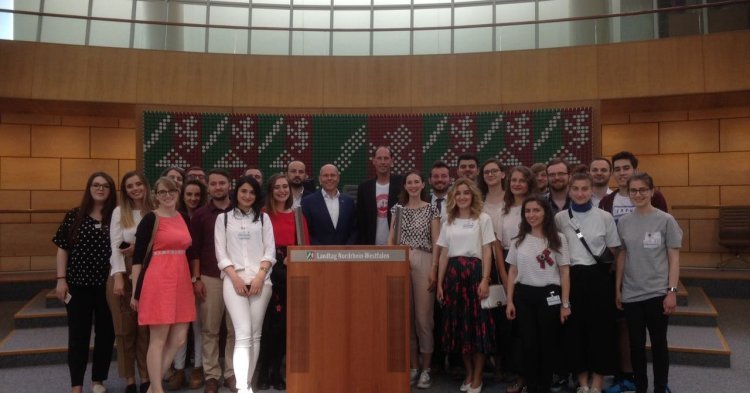The EU, Western Balkans, and the particular case of Kosovo
Kosovo’s relations with the EU, migration and populism: these topics were at the core of a twinning exchange between the German regional JEF section of North Rhine-Westphalia and JEF Kosovo. The project, which consisted of two meetings in Pristina in 2016 and in Düsseldorf in 2018, presented an occasion to learn about current political debates in both societies. Discussing Kosovo’s path to the EU couldn’t be more topical than at this time, with the European Commission revising its Western Balkan strategy and Kosovo celebrating its 10th anniversary of independence. How do these events reflect the country’s future relations with the EU? What is our role in this as a political youth organisation?
Where Kosovo and the EU stand
The stabilisation and association agreement, which is one of the first major steps for a country towards closer relations to the EU, was signed between the EU and Kosovo in 2015. The agreement focuses on respect for key democratic principles and core elements that are at the heart of the EU’s single market. EU enlargement Commissioner Johannes Hahn talked about “a milestone for the EU-Kosovo relationship”. However, progress in its implementation has been limited by sensitive issues such as the fight against corruption or relations with Serbia.
The EU made improving relations between the two neighbours a precondition for their entry to the EU. Regular meetings between both countries’ leaders take place thanks to the EU-facilitated Dialogue for the Normalisation of Relations between Belgrade and Pristina. EU High Representative Federica Mogherini seems to have an open heart for the region – but the commitment is linked to the progress that both sides show in this Dialogue. The EU will be careful not to import unresolved conflicts to its territory.
The EU and the Western Balkans – political momentum?
2018 marks a year where numerous events and policy dialogues in the “EU bubble” discussed enlargement to the Western Balkans once again. The publication of the European Commission’s revised Strategy for the Western Balkans in February 2018 brought a new boost to the region after a long period of silence around the question of enlargement. This process has been largely supported by the Bulgarian and now the Austrian Presidency of the EU Council.
While many discussed the indication of the year 2025 as the next date for possible enlargement, EU officials and policy experts underline that this date should only serve as an “orientation” for candidate countries. As a follow-up the latest General Affairs Council meeting in June stated that accession negotiations with Albania and the Former Yugoslav Republic of Macedonia may be opened by June 2019. Both countries are pending reforms in their judicial systems and increased efforts in the fight against corruption.
What’s the case for Kosovo?
With regards to Kosovo the strategy pledges: “Kosovo has an opportunity for sustainable progress through implementation of the Stabilisation and Association Agreement and to advance on its European path once objective circumstances allow.” Brussels expects more efforts from Pristina – but besides judicial and economic reforms there’s another major challenge on Kosovo’s European path. It is not recognised as a country by five European Union Member states (among them Greece and Spain) out of fears about the separatist tendencies of their own minorities. This particular situation makes it difficult to negotiate: at the EU-Western Balkans summit in Sofia in May, Spain’s former Prime Minister Mariano Rajoy avoided being photographed with Kosovo’s president and cancelled his participation in the second day of the conference.
As a result, discussions about Kosovo’s path to EU accession can be frustrating and highlight that there is still a long way to go. One of the JEF group’s interlocutors spoke about the timeframe of 8-12 years before it becomes a candidate country; another said that EU enlargement remains “extremely unpopular”. Given the fact that the national parliaments of every EU member state have to approve the entry of every new member to the club, in a time where the EU faces multiple crises, enlargement wouldn’t come to an easy vote.
The German-Kosovar group left these meetings with mixed feelings. All of us young people in Europe strive for good education and job opportunities. All of us want to have good living conditions. Travelling across the continent without any restrictions is maybe the most popular achievement of a united Europe. When it comes to mobility we are talking about the most pressing issue for our friends from JEF Kosovo and their peer group.
Kosovo is the only country in the region that does not enjoy visa liberalisation with the EU. Many Kosovars hoped that the process of visa liberalisation would be accelerated after the progress Kosovo had made in the case of its border demarcation with Montenegro, a dossier the EU paid a lot of attention to. Yet, the process does not seem to be making any headway.
Given the economic reality in Kosovo and the high unemployment rate of around 50% for those aged 15-24 (who represent half of the entire population), the emigration of thousands of people in search of work over the past decade is not surprising. Well-educated university graduates, in particular, are missing jobs due to a lack of investments in the private sector, start-up funding for entrepreneurs or any job integration policy.
Joining the EU doesn’t bring miracles …
High expectations regarding EU membership must also be measured against reality – joining the bloc comes with many obligations and rules to apply, especially in the economic sector. For a small economy, those adaptations mean heavy costs. At the same time, the EU still hasn’t managed to push forward highly-needed reforms to make its economy, and especially the Eurozone, better prepared and crisis-proof. Current infringement procedures against Poland and Hungary show that the bloc is struggling with internal alliance to its core values and its treaties.
In the JEF exchange it became clear that the discussion on EU accession is less focused on the obstacles to face than on the country’s European identity and belonging. The high investments in Kosovo from the EU, motivated mostly by geopolitical reasons, and the country’s leadership narrative of a future embedded in and depending on Europe, have created hopes and expectations among its people. After only 10 years of experience as an independent state, the young country has had little time to build its identity as a sovereign state.
The European path of Kosovo should not remain an aim it itself but the result of the efforts of the country which after a bloody past is tackling its main challenge, creating a functioning state that provides for its people and sustains peace. This is what young people in Kosovo should hold their leaders accountable for.
… ‘people-to-people’ integration does
Besides these discussions, it is important to keep in mind what being European is all about in the end and what matters to our continent’s cohesion: personal encounters and ‘people-to-people’ integration. Scepticism and prejudices towards the “Balkans” as a geographical location that very few people are familiar with have to be seized through exchanges and information about the individual countries and our common European history.
Before the German JEF group left for Pristina, many people in our friend groups and families were actually worried or asking questions about the state of security in Kosovo. Images of war and destruction do not disappear easily from people’s minds. Bringing back memories of unforgettable evenings, great cafés in Pristina, the nightlife, welcoming people and an active civil society is probably the best way to change that.
Despite the different conditions young Germans and Kosovars are facing, there are many topics, concerns and interests we share. While discussing Germany’s history of migration with a migration expert, we realised once again how many links exist between Europe’s people. People move, and so did some of our participants’ families from Kosovo during the war in 1999. To share and compare stories of migration, both past and present, within the group was an enriching and emotional experience. Talking about political issues is one thing, but discovering a city together, listening to Albanian music at a barbecue, exchanging typical German sweets and simply being open and interested in the others’ culture and background is crucial to keeping a good dialogue and to strengthening our own and Kosovo’s European identity.


Follow the comments: |
|
